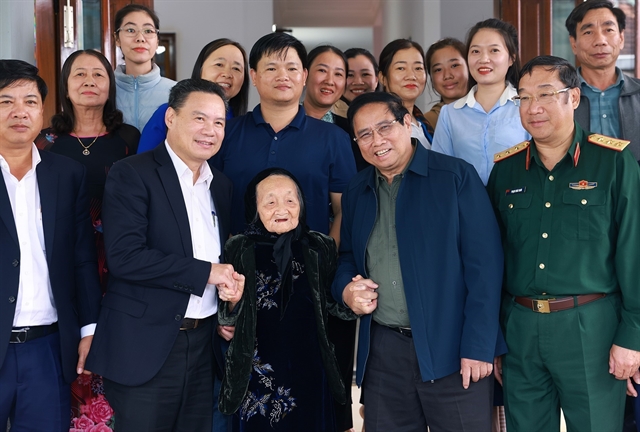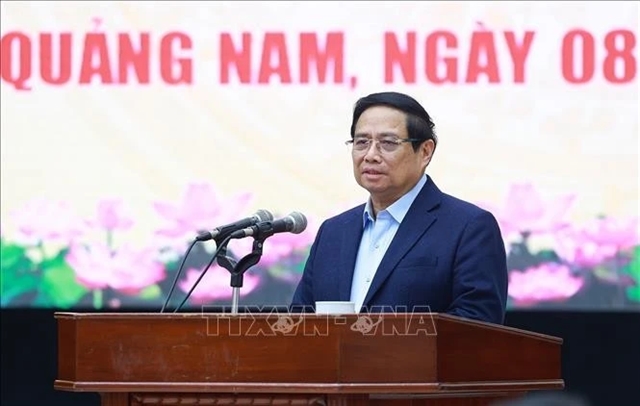 Society
Society

 |
| Prime Minister Phạm Minh Chính speaks at the meeting with leaders of Quảng Nam Province on February 8, 2025. VNA/VNS Photo |
QUẢNG NAM – Prime Minister Phạm Minh Chính had a meeting with leaders of Quảng Nam on Saturday afternoon, during which he required the central province to strive to achieve a growth target of at least 10 per cent in 2025.
Appreciating the province’s socio-economic development results in 2024 and early 2025, especially in economic growth, social welfare assurance, infrastructure development, and investment attraction, Chính affirmed that these accomplishments have contributed importantly to the country’s growth in all aspects.
However, he expressed concerns that Quảng Nam has not yet fully tapped its unique potential, outstanding opportunities, and competitive advantages, especially in socio-economic development.
According to the leader, some officials, civil servants, and public employees have not truly dedicated their time, effort, and commitment, nor fully devoted their attention and attachment to the locality. The province has a comprehensive range of transportation modes, but they remain incomplete, and lack connectivity and integration. There is also a shortage of high-quality human resources. The living conditions of a portion of the population, especially those in mountainous and remote areas, remain challenging. The investment and business environment has seen slow improvements.
The Prime Minister asked the province to review its goals and tasks and strive to complete the socio-economic development plan for the 2021–2025 period; effectively implement the resolutions of the central and local authorities, as well as the identified plans and programmes.
It is essential for Quảng Nam to clearly recognise its unique potential, outstanding opportunities, and competitive advantages to promote development, particularly in industries such as manufacturing, energy, commerce, logistics, tourism, and services, he noted.
It was also advised to revise its plans, objectives, and solutions; assign specific tasks to departments, sectors, localities, and businesses; revitalise traditional growth drivers such as investment, exports, and consumption, while fostering new ones, including digital transformation, green transition, circular economy, knowledge economy, science and technology, and innovation, especially in sectors like semiconductors, big data, cultural industries, and entertainment.
Quảng Nam must urgently complete the implementation of the 12th Party Central Committee's Resolution 18 on the streamlining of the organisational apparatus, in tandem with improving the quality of its contingent of civil servants and public employees, Chính stressed, asking it to focus on implementing three strategic breakthroughs of institutional reform, infrastructure development, and human resources training.
PM Chính asked Quảng Nam to innovate its mindset and launch policies and mechanisms to mobilise maximum resources for development; focus on eliminating temporary and dilapidated houses and strongly promote social housing; and ensure social security, especially providing material and spiritual well-being for people in remote, border, and island areas.
The province must ensure public order and social safety; protect the environment and adopt green and sustainable development; attach great importance to Party and political system building, develop a contingent of officials and civil servants with sufficient quality, capacity, and prestige; and well organise Party congresses at all levels leading up to the 14th National Party Congress, he said.
The PM requested ministries and sectors to support and closely coordinate with Quảng Nam province to help fulfill its tasks.
He said he believes that with the joint efforts of ministries and agencies, along with the will, aspiration, and enthusiasm of the provincial Party Committee, authorities, and people, Quảng Nam will overcome all challenges, seize opportunities, actively stimulate internal strength, and make comprehensive and sustainable breakthroughs, achieving better results in 2025.
Lê Văn Dũng, Chairman of the provincial People’s Committee, reported that the province’s socio-economic situation showed positive growth in 2024. The gross regional domestic product (GRDP) increased by 7.1 per cent, and total social investment reached nearly VNĐ36 trillion (around US$1.45 billion), with public investment amounting to over VNĐ9 trillion ($360 million). State budget revenue hit VNĐ27.6 trillion ($1.1 billion), a 10.1 per cent year-on-year increase.
In terms of investment, Quảng Nam welcomed 29 new domestic projects, approved 10 new foreign direct investment (FDI) projects, and adjusted 25 existing FDI ones. At the end of 2024, the province had a total of 1,157 domestic projects with a combined investment of over VNĐ226.89 trillion ($9 billion) and 201 active FDI projects with a total registered capital of $6.36 billion.
The province’s total import-export turnover neared $4.5 billion. It welcomed more than 8 million visitors last year, a 14 per cent increase year-on-year, exceeding the annual target by 6 per cent. International arrivals alone totaled 5.5 million, marking a 20 per cent rise from the previous year. Tourism revenue reached over VNĐ21.6 trillion ($870 million).
Cultural and social activities were further strengthened, with social welfare programmes, particularly for disadvantaged groups, being effectively and promptly implemented. By the end of 2024, the poverty rate had fallen to 4.56 per cent, and more than 60 per cent of the target for repairing dilapidated homes was achieved.
A key milestone in 2024 was the successful implementation of Resolution No. 18-NQ/TW, issued by the 12th Party Central Committee in 2017, aiming to streamline the administrative apparatus for higher efficiency. As a result, the number of provincial departments was reduced by 31.6 per cent, agencies under departments by 21.8 per cent, and public service units by 18.5 per cent. VNS




